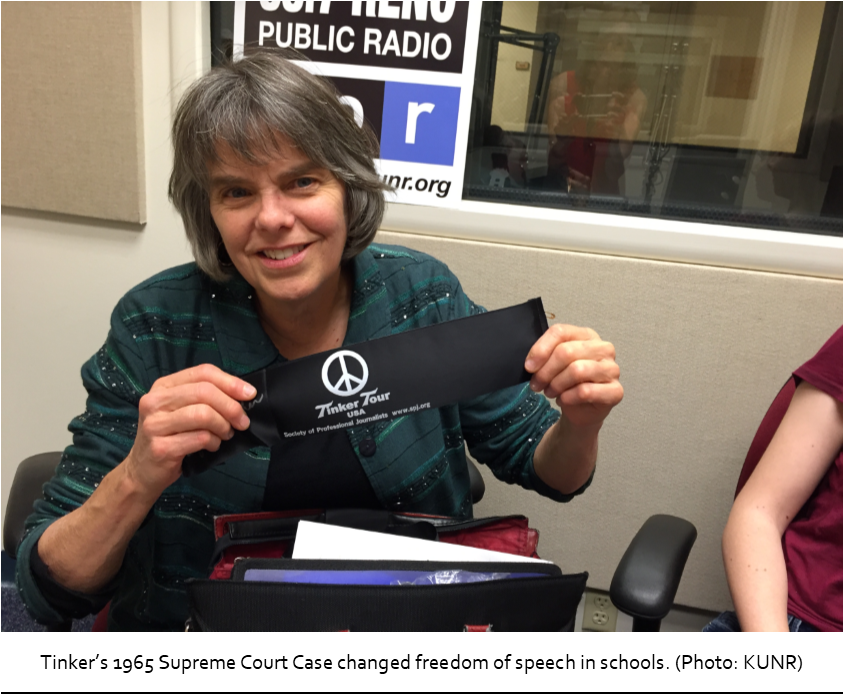
On May 30th, during second and third period, Williamsville East will be hosting Mary Beth Tinker who was just seventeen years of age when she and a group of students from Des Moines, Iowa won the landmark Supreme Court case Tinker v Des Moines Independent Community School District.
The legacy of Tinker v Des Moines in incredible as it has been the legal precedent for student’s rights all over the country from dancing bans, to pro-LGBT shirts, to mass student protests following the shooting at Marjory Stoneman Douglas High School which we at East participated in.
Today Mary Beth Tinker, a retired pediatric nurse who holds a masters in both public health and nursing, tours the country advocating on behalf of youth activism and youth rights.
We are so fortunate to establish a connection with Mary Beth Tinker after she was invited to speak ten years ago at the Human Rights program Dr. Redmond is involved within the summer, Redmond said. They had her back last summer, and he thought it would a phenomenal opportunity to have her speak to our students. He applied for a grant with the Williamsville Educational Foundation and received the funding, at which time the East Administration also contributed funds to cover the cost of Ms. Tinker. Dr. Redmond exchanged emails and was able to set a date for May 30th, and this year marks the 50th anniversary of the Tinker v Des Moines decision.
Dr. Redmond is very excited to welcome Ms. Tinker to Williamsville East and believes that her story and persona will resonate with our students because she was a high school student when she created national change and believes very strongly in the power of young adults.
Mary Beth Tinker grew up in a Methodist family who was heavily involved in the Civil Rights Movement and even participated in Freedom Summer, a campaign designed to register African Americans to vote during the summer of 1960 in Mississippi.
In December of 1965, while Ms. Tinker was a middle school student at Warren Harding Junior High School, a group of Des Moines students gathered in sixteen-year-old Christopher Eckhardt’s and planned on wearing a black armband in support of the Christmas Truce in the Vietnam War, and in remembrance of the thousands dead on both sides of the war. They planned on continuing to wear the armband through Christmas Break and into the New Year. Later in December, Des Moines School District principals met to propose a preemptive ban declaring that any student who wore an armband would be asked to remove it and failure to do so would result in a suspension.
On December 16, Mary Beth Tinker and Christopher Eckhardt wore the black armband and the following day Mary Beth’s brother John Tinker followed suit. The students were suspended and did not return to school until after the winter break. Threats were made against the family immediately following the Tinker’s suspension, red paint was thrown on their home and a local radio show host said he was going to kill their father. Upon returning to school, they did not wear their armbands but did wear all black for the rest of the school year, and filed a First Amendment lawsuit.
On January 3, 1966, the Des Moines School Board voted to uphold the principal’s ban. The case was taken on by the Iowa Civil Liberties Union, a chapter of the American Civil Liberties Union and Dan Johnston, a young lawyer from Des Moines. In March of 1966, the Iowa Civil Liberties Union filed a lawsuit with the US District Court of the Southern District of Iowa. The court dismissed the case and sided with the school district, the Iowa Civil Liberties Union appealed the decision to the US Court of Appeals for the 8th Circuit. The appeals court was split, allowing the district court’s ruling to stand. They continued to appeal the decision until it reached the Supreme Court on November 12, 1968. On February 24, 1969, the Supreme Court handed down a 7-2 majority in favor of Mary Beth Tinker and the other students stating that students do not, “shed their constitutional rights to freedom of speech or expression at the schoolhouse gate.”
The Supreme Court found that a student could not be censored while in school so long as the action is not disruptive to the learning environment and because a black armband is inherently not disruptive, the Tinkers and other students were well within their first amendment rights of free speech and free protest.
If you are interested in attending on May 30th, you can contact Dr. Redmond in the Social Studies office for more information.
